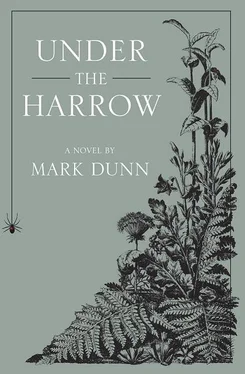The bridge, in this sense, had become a loose link between two very different worlds, and a stark reminder of how distinct one Dinglian was from the next, even as we all had been forced by estrangement from the Beyonders to band together in a form of consolidation that should have been blind to all class and fortune. Here stood we all at one end of that other bridge — the metaphoric one that joined Dingley Dell to the Terra Incognita, and there on its opposite end stood every Outlander behind a thick, obscurant wall of fog and mystery. Though the irony of it was quite clear to me, it was now become even more illuminative on this particular day and in this particular way, the possibility now existing that the world beyond our valley could very well be everything utopian that we had ever dreamed of or everything nightmarish that a Dinglian had reason to fear. All of it promised to be of such transformational import as to make those differences between Scadgers and Pupkers, West Enders and East Enders, the high brow and the low class altogether petty and immaterial, and totally inconsequential.
Two women of class and breeding had pinched their noses to feign revulsion (for there was, in truth, no polluting stench emanating from Scadger despite his soiled garb) and a chemist had denied a sick young girl something to ease her destructive cough. Sir Dabber’s son Bevan, even having regained his sentience, had sat with three others in a dark and dismal hole beneath a hospital that executed refusals and disallowances as its wont and in the face of every appeal to clemency; pauperish Scadgers were being relegated to filthy mews, which still, I had no doubt, reeked of the equine manure that had marked their former employment, because it served their duplicitous owner’s feint to good civic stewardship. Whatever truth there was to there being something outside the valley to put an end to life as we knew it in this final season, Dingley Dell was fairly rotten at its core withal, and, one might argue, partially deserving of its impending demise.
Yet what of those who wept over the inequities, who ministered to the sick, who attempted to uplift the poor? What of those who followed in every way the teachings of our Lord Jesus Christ, whose life was paragon? Were these virtuous exceptions to the rule sadly noted above to receive some form of dispensation, some accommodation, some compensatory kindness?
My head continued to throb as I contemplated such onerous questions, and as Harry Scadger and I reached the eastern end of the bridge (this end left without whitewash as if impoverished East Enders were not even deserving of so much as bright paint and clean varnish upon their own side of a public construction). My meditations received an abrupt check by the sound of my name being called by someone to my rear. The voice belonged to my young friend Mulberry Timberry, who quickly overtook me and seised my right hand with both of his own to better execute a most violent shake.
“Thank you, sir, thank you, thank you, and again I say thank you.”
“And for what reason do I find my arm being nearly wrung from its socket, Timberry?”
Scadger had stopped a few steps ahead of me and now turned to behold what was transpiring behind him with a curious cock of the head, a tilt shared with brothers who perhaps learnt to display inquisitiveness by observing in their own puppyhood how curiosity was most often demonstrated by the many mongrels that survived in the apricot grove by means of scraps and vermin of the field and large doses of Scadger affection.
“I’ve just spoken with Sir Dabber. Oh, I beg your pardon, sir,” said Timberry to Scadger. “Your servant, sir: Mulberry Timberry. Although I must admit that I don’t know you.”
“Scadger, Governor. Harry Scadger.” Another hardy double-palmed pump of the hand, this time for Scadger.
“Ah yes, one of the apricot clan. I haven’t seen much of your people, but in my own defence, you have lived a rather isolated existence on the whole.”
“To be sure we have, Mr. Timberry,” answered Harry Scadger.
“Please don’t call me ‘mister.’ For as of to-day, my good man, I am in name and fact…a doctor of medicine.” Turning to me, with a face flushed with excitement and overflowing affability: “You see, Sir Dabber has decided to recommend to the licensing sub-committee of the Medical Board my installation as practitioner-in-full. It is as good as done. And I know, Trimmers, that I have you to thank for your promotion of my lifelong objective. I can think of no other way to shew my gratitude other than to say thank you until I grow blissfully hoarse.”
“No. You mustn’t do that, Timberry,” I replied with a chuckle. It would have been difficult not to smile and congratulate and join the young man in his infectious celebration. “We shall drink to you, Timberry, as soon as I am sufficiently recovered from my foray into the vineyards with Sir Dabber last night. But for now, I must accompany my friend Scadger to his new home in the Mews. His daughter Florence is in a bad way and we must take her this medicine.”
“I’ll join you,” the young doctor returned. “The young girl shall be my very first patient, though my shingle has yet to be hung.”
Scadger eyed the sprightly young man with some suspicion.“We live in the East End. In the Pupker Mews.”
“Yes, I naturally assumed that this was to be our destination.”
“And you do not demur?”
Timberry shrugged. “Why should I?”
“There’s only one physician who condescends to treat patients in the East End. And if I may be candid, sir, one is better off not to summon him, for his cures are sometimes more injurious to the patient than the complaint itself.”
Timberry laughed in a boyish manner that reminded one in an instant how very young he was to be taking up the mantle of physician and healer. “You must put him totally out of mind, Mr. Scadger, for he has been retired. As of to-day that most decrepit old gentleman joins the ranks of the superannuated set. I am to be the one who attends to the poor of the East End from this day forward, and I relish the challenge, I most certainly do! Lead on, my good man. Let me attend to your infirm daughter Florence, full stop, end of discussion.” Seeing the bottle of cough syrup in my hand, Timberry took it and examined the label. “This is good. This will help. What we need here in Dingley Dell is a true sanatorium for our consumptives; the lung hospital is nothing more than a scrofula warehouse. I cannot believe that I am a doctor now! Trimmers, I am walking upon clouds. Now I must be subdued when I see the girl. I must be subdued and sober and evince maturity.”
An interval of quiet succeeded these words as we walked along. I couldn’t help thinking of how happy I was for Timberry and how grateful I was that Sir Dabber had changed his opinion of the young man based upon my own good opinion. It was good that Dabber and I were now allies, each warmed by the incandescent rays of mutual respect. It would be good as well to have as many allies as fate would permit in these days to come— days that would put each of us to the test within that crucible that would prove to be unlike any other that the mind can possibly imagine.
Chapter the Thirty-fourth. Thursday, July 3, 2003
 f one were to take a torch to the Pupker Mews and reduce all the structures therein to elemental charcoal and ash, and then sweep away the smoking ruins, and leave in its place a stark, besooted vacancy, one would say that this was a far, far better thing one did, than to leave extant that which presently assaulted the gaze and troubled the heart. Stables they once were, and little more than stables they still seemed to be, and how merciless it was to think that two-legged beasts should adapt so readily to a place hardly fit even for quadrupedal habitation!
f one were to take a torch to the Pupker Mews and reduce all the structures therein to elemental charcoal and ash, and then sweep away the smoking ruins, and leave in its place a stark, besooted vacancy, one would say that this was a far, far better thing one did, than to leave extant that which presently assaulted the gaze and troubled the heart. Stables they once were, and little more than stables they still seemed to be, and how merciless it was to think that two-legged beasts should adapt so readily to a place hardly fit even for quadrupedal habitation!
Читать дальше

 f one were to take a torch to the Pupker Mews and reduce all the structures therein to elemental charcoal and ash, and then sweep away the smoking ruins, and leave in its place a stark, besooted vacancy, one would say that this was a far, far better thing one did, than to leave extant that which presently assaulted the gaze and troubled the heart. Stables they once were, and little more than stables they still seemed to be, and how merciless it was to think that two-legged beasts should adapt so readily to a place hardly fit even for quadrupedal habitation!
f one were to take a torch to the Pupker Mews and reduce all the structures therein to elemental charcoal and ash, and then sweep away the smoking ruins, and leave in its place a stark, besooted vacancy, one would say that this was a far, far better thing one did, than to leave extant that which presently assaulted the gaze and troubled the heart. Stables they once were, and little more than stables they still seemed to be, and how merciless it was to think that two-legged beasts should adapt so readily to a place hardly fit even for quadrupedal habitation!










